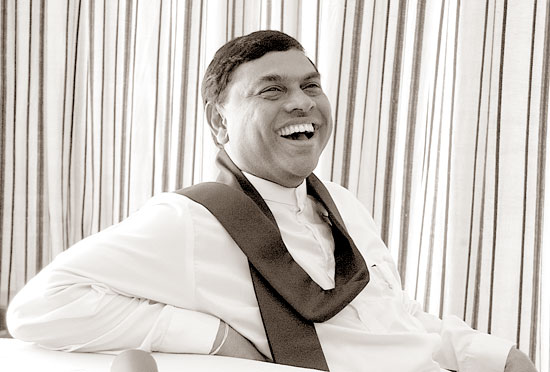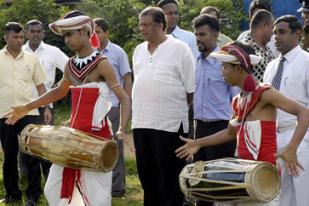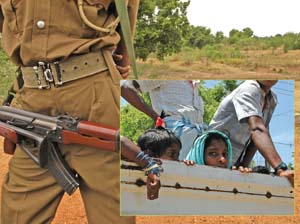by M. I. M. Mohideen
In the absence of official figures from the Government Department of Census and Statistics, the population of the Eastern Province and the eligibility to seats in the Provincial Council according to the ethnic ratio may be expressed as follows:
Atrovent nasal spray over the counter uk
The ruling UPFA contesting in alliance with the TMVP and the Muslim ministers in the present government has had talks with the Sri Lanka Muslim Congress (SLMC) to form a common list for the Eastern Provincial Council election scheduled to be held on May 10. SLMC had rejected the proposal.
At a meeting of Muslim civil society and religious leaders with the SLMC leader and party High Command members to join all Muslim parties under one common symbol, Mr. Hakeem had said that the SLMC would contest only under their own symbol the Tree.
But the SLMC is now contesting the Eastern Provincial Council election in alliance with the UNP under the Elephant symbol.
The TMVP leader Sivanesan Chandrakanthan alias Pillayan is insisting that a Tamil should be the Chief Minister of the Eastern Province. But President Mahinda Rajapaksa has said that the Chief MinisterA?a??a??s post would be available for the party which gets the majority seats at the election.
If Pillayan becomes the Chief Minister of the Eastern Province, he will have at his disposal an armed force of his own and the powers on land, local government and public administration.
………………..
In the last 50 or 60 years, during which Sri Lankan government mounted a constitutional struggle, you will not come across a solitary Muslim voice against the aspirations of the Sinhala people. Muslim representatives did not go before Royal Commissions, or have they gone before the international community with any accusation and sought to blacken the image of Sri Lanka government. In fact, if there is one community that could legitimately complain of being discriminated against in the field of education, land alienation, public administration and security which come under the purview of the state, it could be the Muslims.
There are a number of events occurring in the East which directly affect the Muslim people. Muslims cannot understand why the government is not taking their concerns seriously. They have the feeling that they are being left to the grace and favour and the mercy of the TMVP which is a heavily armed terrorist organisation with a high record of atrocities against the Muslims in the East.
After the ceasefire during the UNP regime, the Muslims have been denied access to mosques during mass agitation promoted by the LTTE. Further, there are the incidents at Muttur, Kinniya, Valachenai, Eravur, Addalachchenai and Akkaraipattu where the LTTE – Karuna / Pillayan group and other Tamil militants destroyed properties worth billions and abducted and killed hundreds of Muslims while praying in mosques.
LTTE-Tamils are unlawfully occupying 63,000 acres of agricultural land belonging to 15,000 Muslim Families in the East.
Ampara District
Former Muslim majority Panamapattu DRO Division, 472 sq. miles, population 26,916. When redemarcating the new administrative divisions, 19,831 – 74% Muslim Majority Pottuvil AGA Division was given only 22% – 103.9 sq. miles and the balance 78% – 368.2 sq. miles land area was allocated to the 7,085 – 26% Sinhala majority Lahugala AGA division. Now the Sinhalese and the STF in Lahugala are objecting the Muslims cultivating the state land which they have been cultivating on government permit earlier.
In the Sammanthurai Muslim majority DRO division, nearly 50 sq. miles of land area covering the Hardy Institute, Ampara Tank and the Town area was separated and added to the Sinhala majority Wewagampattu South – Uhana AGA division.
When compared with the land area of Sinhala majority Lahugala AGA division and the land areas of Muslim majority Kalmunai AGA division, the Sinhalese are having 208 times more than the land area of the Muslims. When comparing the land areas for the Sinhalese with the land area for the Muslims in the Muslim Majority Ampara District, the Sinhalese land area is 13 times more than the Muslim land area.
Batticaloa District
Serious issues have been raised by Muslims of Batticaloa on the ongoing activities of the several international organizations assisted by the government and the Tamil Makkal Viduthalai Pulikal (TMVP) in resettling the displaced Tamils on lands owned by the Muslims.
After 1985, LTTE forcibly occupied Muslim residential, agricultural and cattle farming lands – more than 35,000 acres in areas under their control. The GOSL did nothing to restore these properties owned by the Muslims on title deeds, government permits and the paddy cultivation register.
The displaced Muslims suffered untold hardships during the last 22 years. Now after the GOSL cleared these areas of the LTTE, the TVMP of Pillayan with the help of the government security
forces and INGO assistance, is putting up permanent houses, churches, temples and schools in the Muslim lands forcibly occupied by the LTTE without any consideration for MuslimsA?a??a?? right to settle the displaced Muslims who are the lawful owners of these lands.
The Batticaloa district consists of 14 Pradeshiya Sabhas and covering an extent of 2633 sq. km. There are four predominantly Muslim DS divisions and the land area – Kattankudi 3.4 sq. km. Eravur Town 3.89 sq. km., Koralaipaththu West (Ottamavadi) 6.84 sq. km. Koralaipaththu Central 6.50 sq. km. Total extent of Muslim land area approximately 20.0 sq. km., which is less than 1.0% of the total area of Batticaloa District where the Muslim population is 33% today.
Although the Local Government Commission declared Koralaipaththu Central – the area of historical habitation of the Muslims, covering more than 240 sq. km. and consisting of 11 Grama Sevaka Niladhari divisions, the boundaries have not yet been demarcated on ground. The TMVP of Pillayan has encroached on more than 110 sq. km.
Of the agricultural and cattle farm lands, more than 12,000 acres owned by the Eravur Muslims lie along the Chenkaladi – Badulla – A5 road. Today the entire area along this road has come under the control of GOSL armed forces. Arrangements are being made now to bring back the Tamils who have been unlawfully occupying Muslim lands and settle them permanently by the TMVP of Pillayan and the Government armed forces without any consideration of the displaced Muslims by the LTTE.
During the ethnic conflict 1983, 1985, 1990 etc., more than 12,700 Muslim families were chased out by the LTTE and they forcibly occupied all the Muslim lands that came under LTTE control. The GOSL did nothing to provide any relief or pay compensation for the loss of livelihood of these displaced Muslims.
Resettlement of displaced Tamils on Muslim land in Iyankeni, Meerakerni, Mitchanagar, Hidayathanagar, Thakvanagar in and around Eravurpathu Pradeshiya Sabha would further deteriorate the peaceful co-existence of Muslims and Tamils in Eravur.
Ollikulam, Sikaram, Karbela, Palamunai, Kankayan Odai, Keechampallam are the Muslim border villages of Kattankudi in Arayampathi Pradeshiya Sabha. Displaced Tamils after the A?a??E?TsunamiA?a??a?? and GOSL military operations to flush the LTTE terrorists in the Paduvankarai Tamil villages have been temporarily settled in private lands owned by the Muslims and the Mosques. Now the TMVP of Pillayan with the assistance of government armed forces and help from INGOA?a??a??s is making arrangements to provide accommodation to settle the displaced Tamils who have come from Paduwankarai Tamil areas, permanently on land belonging to the Muslims and the mosques, depriving the Muslims, the lands belonging to them.
Trincomalee District
How much vitamin k when taking coumadin
Kuchchaveli in Trincomalee district is a predominantly Muslim area. Total population 29,967 and 8,058 families. 65% Muslims 19,443, 31% Tamils 9,282, 3% Christians 905 and 01% Sinhalese 337. Kuchchaveli Pradeshiya Sabha 9 members, Muslims 6, Tamils 3.
But the Divisional Secretary is a Tamil in the predominantly Muslim division. Of the total number of 24 grama niladharies 65% Muslims are given only 7 GSs and the balance 17 GSs are given to the Tamils who are only 35%. Average population of a Tamil GS division is 250 people whereas the population in the Muslims GS division is around 1350.
After de-merging in October 2006, the Eastern Province administration is being ethnically transformed. Appointing retired administrative and security officials well-equipped to implement the A?a??E?SinhalisationA?a??a?? process.
Sri Lanka government has designed a new flag for the Eastern Province. The Muslim community which is the largest ethnic group in the East today has raised serious concern over the failure of the government to recognise this community by not printing any symbol in the flag to represent the Muslims.
Although the Muslims have not staged a war against the government of Sri Lanka for the settlement of our grievances, they are the worst affected lot in the East. The Indo-Sri Lanka Accord, the 13th amendment to the constitution and the provisions of the Provincial Council Act have failed to meet the legitimate and reasonable demands of the Muslims. They have failed to protect our lives and properties. They have failed to promote socio-economic interest of our people. They have failed to recognise the different ethnic and political aspiration of the Muslims. This total disregard shown to Muslim sentiments brings to surface one truth – the government has little or no concern about the safety and security of the Muslim people in the North-East.
Muslims should consider more seriously the present trend and take immediate steps to safeguard our legitimate rights in an appropriate manner. If proper safeguards are not secured now it would amount to be the biggest betrayal of not only the present generation but also those yet to be born in the Eastern province as Muslims.
Land, security, allocation of legitimate share of state land and natural resources to predominantly Muslim local bodies and the resettlement of Muslim IDPs and Tsunami victims are the serious issues that the Eastern Province Muslims are facing today. Therefore it is very important that the majority Muslim community should take control of the Eastern Provincial Council with a Muslim Chief Minister.
source:
http://www.island.lk/2008/04/17/features1.html






 Arugam Forum
Arugam Forum Arugam Photo Galleries on Picasa
Arugam Photo Galleries on Picasa Old Website
Old Website Press Coverage
Press Coverage Surf Forecast for Arugam Bay
Surf Forecast for Arugam Bay
TODAY’s Comments